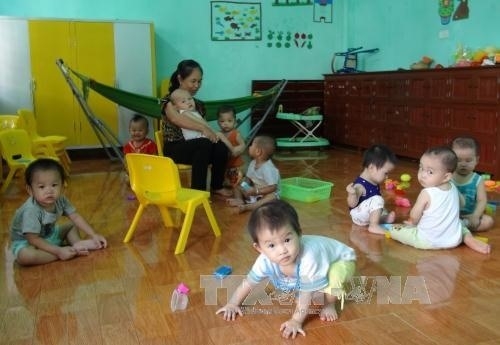Draft of amended Law on Education raises concerns
 |
| Children at a private nursery. Amendments to the Law on Education by the Ministry of Education and Training on private nurseries has raised concerns among parents and teachers.-VNA/VNS Photo |
According to the proposals, the number of children in a private nursery classroom may increase from 50 to 70.
Teachers complain the regulation will place a heavy burden on their shoulders, while parents have raised concerns about the problems of childcare, infrastructure, teaching quality and management.
Speaking with Việt Nam Education online newspaper, Nguyễn Kim Quý, doctor of psychology from Hà Nội Teachers’ Training College, also expressed concerns over the adjustment to the number of children in a private class.
The proposed figure would make the classroom too crowded and unable to ensure the quality of child care, he said.
"Currently, there are only about two teachers per class. If there are 70 children per class, it is impossible to guarantee quality.”
Preschool children differed from elementary school students. They needed both care and education, adding that they were not active in personal hygiene activities, Quý said.
In addition, young children were in the process of forming personalities and psychology, so they needed more care, he added.
Quý pointed out that increasing the number of preschool children in the classroom would increase the pressure on teachers, affecting their psychology, and increasing the chance of stress.
The ministry’s proposed adjustment should be re-evaluated. Every preschool class should only stipulate a maximum of 30 children, according to Quý.
As per current regulation, each private pre-school class should not have more than 50 children, but in practice, at many schools, the number of pupils exceeded this figure due to localties lacking land and facilities to build schools, Nguyễn Bá Minh, head of the ministry’s Department of Pre-school Education, told Lao Động (Labour) newspaper.
The existence of these classes was necessary to meet the needs of many parents when public schools were not able to afford them, he said.
The amendment also aimed to address some difficulties and inadequacies in some localities, especially in industrial parks and high population areas.
“It is necessary for the MoET to review and rectify the State management of preschool education,” said Minh.
To ensure quality, the ministry also required that each class at a private school must have a professional teacher who performs the task of managing the care and education of children under the preschool education programme, he said.
Although the education ministry has provided explanations about the preparation for quality assurance when the number of students increased to no more than 70 students in a class, many parents expressed concern over the loose inspection and management of private preschools in the past.
“Just listening to the increase in the amount of children per class makes me scared, while we are eager to reduce it at preschools and other facilities,” said Nguyễn Mai Hoa, the mother of 3-year-old child in Hà Nội’s Hoàng Mai District.
“At this age, children need more care and teachers work hard to provide care for the children. The education ministry says there are regulations to ensure quality, but not all pre-school facilities will follow this rule.”
“The number of children is still increasing while the infrastructure is unchanged. So why is there such a step backwards. It can not be because of lack of land, infrastructure or lack of schools,” Hoa said.
Trần Minh Tâm, a resident from Đống Đa District agreed. He said if the school’s facilities and the number of teachers do not increase in proportion with the number of students, it will naturally affect the quality of teaching and care.
Trần Mai Lan, a teacher at a private nursery in Hoàng Mai District, commented that the poor facilities and lack of teachers would make it difficult to implement the request from MoET.
Many parents also expressed their worry over the recent violence in some private establishments. Those images still haunt them.
Meanwhile the management and supervision by local authorities on management of the private kindergartens remains limited. These schools are managed by authorities of communes and wards while both they and teachers at private nurseries lack teaching and management skills.
Teaching quality is always a concern at private preschools.
Nguyễn Trọng An, former deputy director of the Child Care and Protection Department, Ministry of Labour, Invalids and Social Affairs, said that such an increase was difficult to accept.
The current needed solution was to increase the number of teachers rather than increasing the number of children per class to ensure better care.
"The World Health Organisation has recommended that children must be fully developed not only physically and mentally but also intellectually, with comprehensive health care, education, fun, culture and spirit,” said An.
What the stars mean:
★ Poor ★ ★ Promising ★★★ Good ★★★★ Very good ★★★★★ Exceptional
Related Contents
Latest News
More News
- NAB Innovation Centre underscores Vietnam’s appeal for tech investment (January 30, 2026 | 11:16)
- Vietnam moves towards market-based fuel management with E10 rollout (January 30, 2026 | 11:10)
- Vietnam startup funding enters a period of capital reset (January 30, 2026 | 11:06)
- Vietnam strengthens public debt management with World Bank and IMF (January 30, 2026 | 11:00)
- PM inspects APEC 2027 project progress in An Giang province (January 29, 2026 | 09:00)
- Vietnam among the world’s top 15 trading nations (January 28, 2026 | 17:12)
- Vietnam accelerates preparations for arbitration centre linked to new financial hub (January 28, 2026 | 17:09)
- Vietnam's IPO market on recovery trajectory (January 28, 2026 | 17:04)
- Digital economy takes centre stage in Vietnam’s new growth model (January 28, 2026 | 11:43)
- EU Council president to visit Vietnam amid partnership upgrade (January 28, 2026 | 11:00)

 Tag:
Tag:




















 Mobile Version
Mobile Version